SFA University
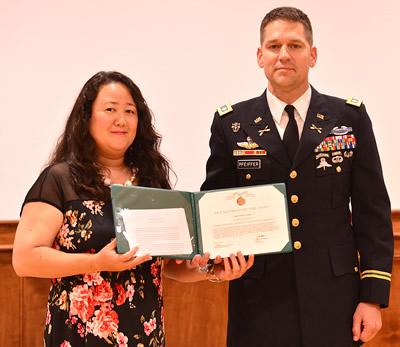
March 24, 2018 Nacogdoches - A Stephen F. Austin State University employee was honored recently with a Public Service Commendation Medal from the U.S. Army.
Sonnie Mosier, an administrative assistant in SFA’s Department of Military Science, received the medal, which is one of the highest public service decorations the Army gives to civilians. According to the Army’s website, the award recognizes “service or achievements that contribute significantly to the accomplishment of the mission of an Army activity, command or staff agency.”
Mosier, who has worked in the military science department for 21 years, has participated in the commissioning of 266 of the 646 cadets who have completed SFA's ROTC program. She serves as the university liaison for military science faculty and staff and supports the cadets in various instances.
“What I’ve enjoyed most about my time with the department is watching young men and women go through the program to be commissioned as second lieutenants,” Mosier said. “I also have enjoyed meeting so many awesome military science faculty and staff who have come and gone.”
After joining SFA in 1994 as a receptionist in the Office of the President, Mosier worked in the Office of Admissions before settling in the military science department. Since then, she has been a continuity in the department by assisting eight department chairs, numerous faculty and staff, and hundreds of cadets.
For more information about SFA’s ROTC program, visit www.sfasu.edu/rotc.
SFA to graduate largest class in university history
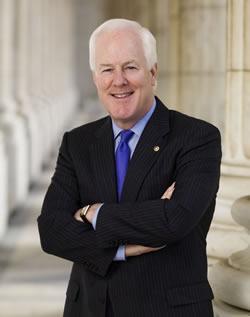 May 12, 2018 Nacogdoches — As Stephen F. Austin State University prepares to celebrate its 95th anniversary, it will graduate the largest class in university history with more than 1,500 candidates. Approximately 1,190 students will receive their bachelor’s degrees, and 335 students will receive their graduate degrees during this historic occasion.
May 12, 2018 Nacogdoches — As Stephen F. Austin State University prepares to celebrate its 95th anniversary, it will graduate the largest class in university history with more than 1,500 candidates. Approximately 1,190 students will receive their bachelor’s degrees, and 335 students will receive their graduate degrees during this historic occasion.
Two ceremonies are scheduled for Saturday, May 12, in Johnson Coliseum with U.S. Sen. John Cornyn offering the commencement address.
Cornyn has served the people of Texas for the past three decades, first as a district judge and later as a member of the Texas Supreme Court before being elected as Texas attorney general. He received his undergraduate degree from Trinity University, his law degree from St. Mary’s University School of Law and his Master of Laws from the University of Virginia School of Law.
In 2014, Cornyn was re-elected for his third term in the U.S. Senate. Since he was first elected in 2002, Cornyn has earned a national reputation as a powerful voice for Texas and conservative values in Washington. A San Antonio native, he has been an advocate for Texas military personnel, veterans and their families, and he has fought to provide them with the best possible support, care and benefits. He also has been a consistent leader in promoting innovation, research and education initiatives at all levels.
In addition to serving on the Senate Finance, Intelligence and Judiciary Committees, Cornyn serves as the majority whip, a position that gives Texas a powerful seat at Congress’ leadership table. In this role, he serves as an assistant to the floor leaders and as chief vote counter for Senate Republicans.
Candidates from SFA’s James I. Perkins College of Education and the College of Fine Arts will participate in a 9:30 a.m. ceremony. Candidates from the Arthur Temple College of Forestry and Agriculture, the Rusche College of Business, the College of Liberal and Applied Arts, and the College of Sciences and Mathematics will participate in a 2 p.m. ceremony.
An estimated 1,528 degrees will be awarded, including 1,193 bachelor’s, 328 master’s and seven doctoral degrees. Almost 400 students will graduate with honors, including 139 cum laude, 135 magna cum laude and 109 summa cum laude. Sixty-three students will graduate with the university scholar designation. One degree will be awarded posthumously.
Master’s and doctoral candidates will graduate with their respective colleges.
Below is Stephen F. Austin State University’s May commencement numbers for the past five years.
Annual May commencement numbers:
May 2017 - 1,409
May 2016 - 1,346
May 2015 - 1,302
May 2014 - 1,237
May 2013 - 1,285
By Kasi Dickerson, senior marketing communications specialist at Stephen F. Austin State University.
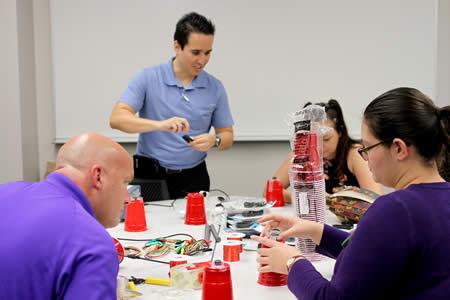
May 10, 2018 - Wires, red plastic cups, magnets and other gadgets blanket the table as eager students await instructions. Dr. Hector Ochoa, assistant professor in Stephen F. Austin State University’s Department of Physics, Engineering and Astronomy, explains how students can use the household items on the table to create a speaker. Soon, students begin constructing their own devices.
This activity was part of the SFA School of Honors’ Maker Fair, an event that introduced students to various disciplines through hands-on activities.
“I really enjoyed showing students that engineering is not as complex as we think,” Ochoa said. “You can use household items to create things that we take for granted, like a speaker.”
Across the room, more students roll up their sleeves and begin to learn printmaking from Neal Cox, associate professor in the School of Art. After learning the proper way to ink a roller, students take turns running the press to print their own image of a tree.
“The goal of the Maker Fair was to provide an opportunity for honors students to interact with each other and with faculty members from across campus while also introducing them to different subjects,” said Dr. Megan Condis, assistant professor in the Department of English and Creative Writing.
The Maker Fair featured activities from four of SFA’s six colleges. Students first visited the Emerging Technologies Lab in Steen Library to participate in a virtual reality demonstration and learn about 3-D printing.
“The overall experience was amazing, and I had fun during each section,” said Jamie Morreale, junior interdisciplinary studies major pursing certification in early childhood through sixth grade education. “I loved learning new things, such as coding, making butter, virtual reality and 3-D printing. I would go to another Maker Fair.”
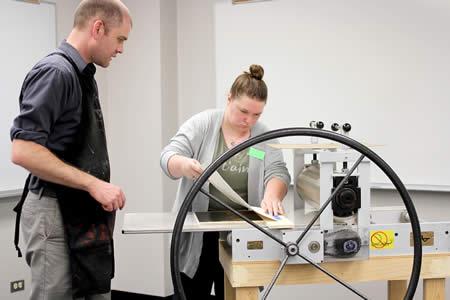
Sara De la Garza, Nacogdoches junior interdisciplinary studies major, also said she enjoyed the event and added that it informed her of all the resources available at SFA. De la Garza intends to become certified as a teacher of students in early childhood through sixth grade.
Students learned to code for an hour with Elizabeth Hutchison, lecturer and interim assistant to the chair of the Department of Computer Science. Additional activities included learning how to make butter and LED bracelets.
“The Maker Fair taught me creativity is more than just painting or writing; it’s a range of activities,” said Emily Crider, Arlington junior studying English and secondary education. “Any passion or hobby becomes creative the minute you add your own ideas or emotions. As college students, we’re so often inundated with grades and GPAs that we sometimes forget to just have fun. In the end, that’s what creativity is — having a good time doing what you love in your own individual way.”
Organizers are planning to host additional Maker Fairs in the future.
New options for academic studies available to SFA students
April 27, 2018 Nacogdoches — Changes in curriculum recently approved by the Stephen F. Austin State University Board of Regents reflect society’s continuing reliance on data and technology.
A new Bachelor of Science in data analytics approved Tuesday is a partnership between the computer science, economics, and mathematics and statistics departments.
“There is a widely recognized and strong need for data analytics professionals in government, industry and education in the United States,” said Dr. Deborah Dunn, professor and interim chair of the Department of Computer Science. “Companies increasingly have access to more data, and this fact is creating opportunities for workers with a particular set of skills.”
Data analytics is the process of extracting meaningful information from data stored by companies and using it to make informed decisions, Dunn explained. The data analytics program will provide a fundamental background in data analytics, including programming, algorithms, database technologies, data analytics techniques and statistical analysis. It also will offer substantial information on economics, forecasting and predictive modeling.
SFA’s Department of Computer Science, home to the only master’s degree program in cybersecurity in Texas, prepares students for careers in areas such as software development, database design and data analysis.
Three new certificate programs also were approved and reflect areas of societal concern and span multiple disciplines. In the School of Human Sciences, a new aging studies program will begin in fall 2018. Two programs added in the Department of Languages, Cultures and Communication include translation and interpretation, and risk and crisis communication.
Some academic programs are being consolidated to better meet the needs and interests of SFA students. Three programs have been converted into concentration areas for the Bachelor of Science in Agriculture. Programs include poultry science, agricultural engineering technology and agricultural development production.
“Agriculture is a healthy degree program at SFA, and it is an important industry in the East Texas area,” said Dr. Mary Nelle Brunson, associate provost and vice president for academic affairs.
SFA is in the heart of millions of acres of forest and offers the only doctoral degree program in forestry in Texas. In an effort to better address student needs, the one-year Texas residency requirement has been eliminated to allow students opportunities to conduct research nationwide. Additionally, forest management will now be offered as a concentration for the Bachelor of Science in Forestry, rather than as a separate major.
Regents ratified a $2 million plan to reconstruct Clark Boulevard and expand facility parking to make additional room for visitors to SFA’s new Ed and Gwen Cole STEM Building. The cost of the plan, which includes additional completion of the building’s fourth floor, is within the approved project budget of $46.4 million. The building is scheduled to open this summer and will house the Department of Physics, Engineering and Astronomy, the Department of Computer Science, a planetarium with a 52-foot dome, and makerspaces, which are learning laboratories that allow students to collaborate and create prototypes or other manufactured works.
“This is not the finish line; this is a beginning. We will empower the next generation of STEM professionals to lead and serve in a changing world,” said Dr. Kim Childs, dean of the College of Sciences and Mathematics, in her report to the board. “We are creating a pathway for students that is purposeful and practical as they move forward into their careers.”
Regents approved renaming areas in the McGee Business Building, which houses the Rusche College of Business. An area on the third floor is expected to be named the Naymola Innovation Hub in honor of Walter E. “Loddie” Naymola, a 1978 alumnus. The fourth floor lobby, which offers economics and finance students a professional meeting environment, will be named in honor of Michael J. Hopkins, a 1970 graduate.
Construction approved for SFA Athletics included renovating a storage area in the Johnson Coliseum basement to create a strength-and-conditioning room for the men’s and women’s basketball programs. Regents approved a budget of $725,000, which includes renovation and equipment costs. In the future, commencement materials previously stored in the basement will be located off campus; therefore, the board approved purchasing a covered box truck for use in transporting the items to and from campus and for other university purposes.
Regents approved a fixed-rate tuition of $226 per semester credit hour for students who enter SFA as first-time, full-time college students in fall 2018 and choose to enter into a fixed-rate program. As required by the Texas Education Code, the fixed rate will not increase for any eligible student for 12 consecutive semesters after the date of the student’s initial enrollment at any public or private higher education institution.
During the Tuesday meeting, the board acknowledged the receipt of an audit services report and approved:
- a summer budget of about $3.5 million for fiscal year 2017-18, which covers two regular summer semesters and a mini-semester
- renewal of the $50-per-credit-hour tuition rate for dual-credit students enrolling in any academic semester, including summer
- ratifying $21,935 in additional grant awards allocable to fiscal year 2018
- policy revisions, curriculum changes and minutes from the January and March meetings
- and a marketing budget for 2018-19.
The board heard updates from SFA’s Center for Career Professional Development regarding the positive impact of its new job-posting system, Handshake, which connects students with potential employers. Richards Carlberg also delivered a report regarding the university’s 2018-19 marketing campaign, which will feature refreshed creative materials, airport signage, billboards and a strong digital media presence.
The Board of Regents also heard reports from Dr. Hans Williams, dean of the Arthur Temple College of Forestry and Agriculture; the Faculty Senate; Student Government Association; and the university president.
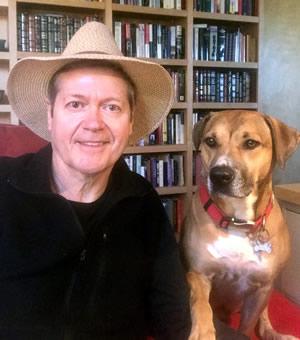 April 27, 2018 Nacogdoches – The Stephen F. Austin State University School of Art and SFA Galleries will present “Red Dirt Memories: Storytelling with Jerry Permenter” Saturday and Sunday, May 5 and 6, at The Cole Art Center at The Old Opera House in downtown Nacogdoches.
April 27, 2018 Nacogdoches – The Stephen F. Austin State University School of Art and SFA Galleries will present “Red Dirt Memories: Storytelling with Jerry Permenter” Saturday and Sunday, May 5 and 6, at The Cole Art Center at The Old Opera House in downtown Nacogdoches.
A native of the Swift community in Nacogdoches County, Permenter, who goes by the name Red DirtBoy on Facebook, grew up in rural East Texas, and his memories of those early years laid the groundwork for what is now the Facebook page Red Dirt Memories, which has quickly garnered more than 5,000 followers.
Permenter will share some of his own “red dirt” memories in storytelling sessions at 2:30 p.m. Saturday and 1:30 p.m. Sunday. Admission is free, but seating in Cole Art Center is limited, according to Lisa Steed, events coordinator for SFA art galleries.
“Jerry’s written and spoken word stories have really created a large nostalgic community of people in a very short time period,” Steed said. “Older locals are particularly enchanted with these memories, but I think we’re all looking for relief from these troubled times and want to feel a connection to our roots.”
Among Permenter’s topics: Dog Trot House, Funeralizing, Cotton Dresses and more.
“His memories are obviously his own, but I’ve found many of the stories have a southern commonality that seems like he lived down the road from me,” Steed said. “I wanted to ask: are we related?”
Many East Texans will remember that Permenter was the founder and executive director of the East Texas AIDS Project based in Nacogdoches in the late 80's in Nacogdoches until 1994. The project later became Health Horizons.
“Red Dirt Boy” is the name Permenter had given last year to a book in progress.
“I grew up in Nacogdoches, and I have a memory on every corner of those red brick streets,” he said. “I've been a technical writer for over 30 years; creative writing was a hobby. ‘Red Dirt Boy’ came about after I lost two siblings and my mom in recent years, and I began to write under that name about some of our experiences growing up.
“The audience for those writings developed organically – usually by word of mouth or through a few websites,” he said. “The reaction to them was so strong that I began to write new ones on a regular basis.”
He now has a collection of stories based on growing up in Nacogdoches County that will be released later this year as "Red Dirt Memories."
Permenter initially began sharing his memories with his two grandchildren so they would know and understand their family history.
“What began with me sharing my own childhood memories – growing up, the struggles and the good memories – seemed to resonate with so many others that local folks began sharing their stories and photos with me,” he said. “That was probably my greatest motivation after I started. Many families had events in their lives that helped shape them, made them stronger and more resilient, but those stories were kept within the family.”
On his Red Dirt Memories Facebook site, membership grew to almost 5,000 followers in less than two months.
“I discovered a commonality we all shared, along with a desire to tell our stories, to share experiences and create community,” he said.
The closed group site generated almost 2,000 members in a brief six-week period. Members can share their family stories and photos, allowing all to see stories and photos of the rural life many experienced growing up.
After leaving the East Texas AIDS Project, Permenter was the executive director of the Alamo Area Resource Center for 17 years. He then moved into consulting nationally. Permenter now splits his professional time between a home office in Santa Fe, New Mexico, and an office in downtown San Antonio. He provides program design, grant writing and evaluation for health and human services programs in both cities. He works with arts and eldercare organizations in Santa Fe while focusing on funding and evaluation of housing, clinical care and supportive services for San Antonio organizations. He has provided technical assistance for nonprofits for the U.S. Office of Minority Health and has overseen projects funded by the U.S. Health and Human Resources Administration. Recently, he founded a comprehensive Health Equity Clinic in San Antonio, which, as the first of its kind in South Texas, has been funded for the past three years by the Elton John AIDS Foundation.
“Red Dirt Boy” will eventually be an AIDS memoir when completed.
During the storytelling sessions, those in attendance will have the opportunity to share their memories and ask questions as time allows.
“I want these sessions to be casual and a shared experience, much like my social media pages Red Dirt Memories and Red DirtBoy have become,” Permenter said. “We have many things to discuss, and some wonderful folks who'll attend, with many great storytellers from the community in attendance. We'll close with questions and comments about all of our own ‘Red Dirt Memories.’
“I've been tremendously blessed by growing up in Nacogdoches and, in many ways, I hope to give back to my hometown at this stage of my life,” he added. “By offering readings, my writings and sharing our collective memories, I think many will enjoy the nostalgia of these stories and find it a great way to spend a weekend afternoon.”
Permenter describes storytelling as “a reciprocal exercise,” and he hopes these sessions will provide a time and place where folks can listen and relive some of their own years of growing up.
“There will be a lot of laughter and, again, a true sense of coming together to share stories in person – something we don’t do enough of in this day of technology overload,” he said. “‘Red Dirt Memories’ is a love letter to Nacogdoches in a very real sense, and my writings are a way of saying thank you to a hometown that helped in creating the man I am today.”
The Cole Art Center is located at 329 E. Main St. For more information, call (936) 468-6557.
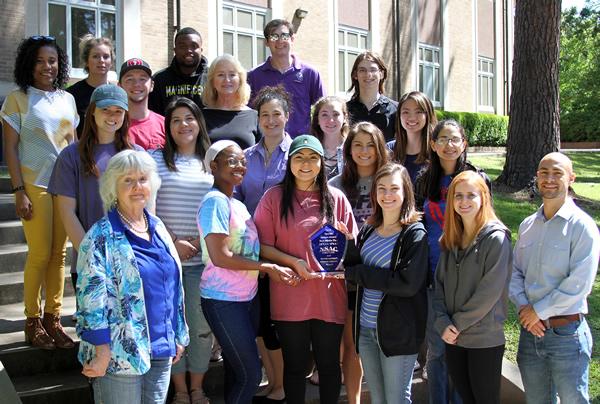
April 26, 2018 Nacogdoches — A team of mass communication, art and marketing students from Stephen F. Austin State University recently won Best Media Plan at the American Advertising Federation’s National Student Advertising Competition in Corpus Christi.
This award recognizes students for their creative use of a $10 million budget in building an advertising campaign for Ocean Spray Cranberries. Since the fall semester, students have built the campaign to increase brand relevance among millennials between the ages of 24 and 34 by conducting brand and target-market research, developing “Own the Ocean” as their central theme and strategy, budgeting and creating a media plan.
During the course of the project, Tyler Fisher, graduate student from Spring, Texas, served in an advisory role to offer students advice, feedback and support.
“As a second-year participant, winning an award means a lot. I know these students have worked hard to come up with something the judges will enjoy. It is a great accomplishment to be recognized for our hard work,” Fisher said.
Their award-winning media plan focused on social media and digital efforts and included test markets to evaluate which messages, tactics, strategies and locations would most effectively reach millennials.
This project was part of an advertising course, and Dr. Seth Bradshaw, assistant professor in the Department of Mass Communication; Dr. Marlene Kahla, professor in the Department of Management and Marketing; and Peter Andrew, professor in the School of Art, worked alongside students on this endeavor.
“I have learned great communication skills from participating in this class and contest,” Fisher said. “I have made friends and connections from this experience, and I urge students who wish to have a career in advertising to take this class. The American Advertising Federation is a prestigious organization, and this class is essential to advancing your education and knowledge of the advertising field.”
SFA competed against schools such as the University of Texas at Austin, University of Houston, Texas Tech University and more. At the competition, teams of four students presented their class’ campaign in a 20-minute presentation.
According to the organization’s website, this premier competition “provides more than 2,000 college students the real-world experience of creating a strategic advertising/marketing/media campaign for a corporate client.”
April 25, 2018 Nacogdoches – A concert by the Contemporary Ensemble at Stephen F. Austin State University, originally scheduled for 7:30 p.m. Thursday, April 26, in Cole Concert Hall on the SFA campus, has been canceled.
For more information, call the SFA Fine Arts Box Office at (936) 468-6407.
April 24, 2018 Nacogdoches — Stephen F. Austin State University's Office of Research and Graduate Studies has announced the recipients of its annual Research and Creative Activity and Research Pilot Study grants.
ORGS and Academic Affairs conduct a university-wide call for proposals, and the deadline for submissions is typically the end of October. The University Research Council conducts a blind peer review of all applications. Grant awardees are notified early in the spring semester and funded through the remainder of the fiscal year.
Dr. Steve Bullard, provost and vice president for academic affairs, approved the award of six RCA grants totaling approximately $130,000 based on the recommendations of the URC. Additionally, the URC approved two spring RPS grants. Both of these programs are awarded through an annual competition and are funded from the university’s Research Enhancement Fund, which encourages and enhances research, offers scholarly and creative opportunities for faculty members, serves as support for innovative research, and provides seed monies to attract external financial support.
The RCA grants provide substantive summer salary support to faculty members in addition to funds for collecting data, producing the creative activity, hiring students to assist, materials, supplies and other similar items. The pilot study program provides seed money to generate pilot data so faculty members may initiate new lines of research and scholarly endeavors.
2018 Research and Creative Activity Grants
Dr. John Brannon Gary – Department of Chemistry and Biochemistry, College of Sciences and Mathematics
Bioinspired D Catalysis: Using Nature as an Inspiration for Developing New Chemistry
Gary’s research seeks to develop new chemical models based on natural enzymes rather than the more expensive metals used in current practices to produce many commodity chemicals. These new systems could potentially impact areas such as alternative energy and the development of new drugs. Gary hopes to use this preliminary data to garner external funding in the future to continue to research using other types of experiments, such as water oxidation.
Dr. Xiaozhen (Jenny) Han – Department of Chemistry and Biochemistry, College of Sciences and Mathematics
The Preparation of Multi-Target Anticancer Prodrugs: Ru(II) (Arene) Complexes with Selenium-Containing Flavonols
Han seeks to develop water-soluble, multi-target anticancer drug agents by combining certain flavonols with metal fragments. The multi-target anticancer drugs are important with diseases as complex as cancer. The use of certain metal ions that possess a lower toxicity could help reduce side effects of cancer treatments.
Candace Hicks - School of Art, College of Fine Arts
Many Mini Murder Scenes
Hicks’ project will expand on the standard theatrical diorama display to incorporate audience participation elements in her crime scene dioramas based on fictional stories. The result will be a public exhibition, including a guidebook that allows the viewer to unravel the clues in the crime scene — not to solve the crime, but to delve into the cultural significance of the mystery.
Dr. Sheryll Jerez – Division of Environmental Science, Arthur Temple College of Forestry and Agriculture
Comparison of Benzene and Other Volatile Compounds in Ambient Air near the Eagle Ford Shale Area
Jerez will develop standard operating procedures for certain analyses performed with the new gas chromatography/flame ionization detector system. In addition, she will research the air quality impacts on people in rural East Texas from fracking sites. The standard operating procedures will be invaluable as Jerez and other faculty members seek to expand their research capacities.
Dr. Christopher Schalk – Department of Forestry and Spatial Science, Arthur Temple College of Forestry and Agriculture
Examining terrestrial food-web structure in managed and unmanaged forests in East Texas
Schalk will concentrate on forest management practices and how they impact food webs (consumer-resource relationships). Such research data will help land managers make more informed decisions concerning forestry practices in addition to providing seed data for Schalk to be competitive in external funding.
Dr. Jacob Turner – Department of Mathematics and Statistics, College of Sciences and Mathematics
Robustness to model selection in longitudinal gene expression studies
Turner will research high throughput gene expression data to develop new theoretical and methodological approaches to improve current standards of practice, which will be useful to the bioinformatics and biostatistics research communities.
Research Pilot Study
Dr. Luis Aguerrevere – Department of Human Services, James I. Perkins College of Education
Effects of Transcranial Direct Current Stimulation (tDCS) on Facial and Emotional Regulation in Individuals with Autism: A Pilot Study
Dr. Hector Ochoa – Department of Physics, Engineering and Astronomy, College of Sciences and Mathematics
Establishing a Methodology to Fabricate and Test Super Coiled Polymer Actuators using Traditional and Conductive Polymers
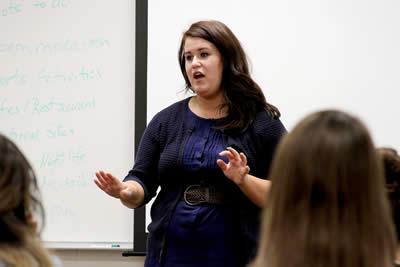
April 17, 2018 - Politics and child development and family living may not seem like your typical match, but for Sydni Mitchell, the two go hand in hand.
As communications director and policy analyst for Texas State Sen. Robert Nichols, Mitchell, a two-time Stephen F. Austin State University graduate, utilizes her unique background and perspective in her daily interactions and to affect policy.
“Every day a constituent calls or I meet with lobbyists or associations about a bill or topic, and it always involves people,” Mitchell said. “To step back and rely on my knowledge of how people’s upbringing impacts who they are and how they act in certain situations is extremely helpful.”
Mitchell majored in child development and family living as an undergraduate and studied public administration in graduate school. She was the SFA student regent from 2010-11, which is where her interest in politics began. She also served as president of the Student Government Association, Circle of Omicron Delta Kappa Leadership Honor Society and Jacks Council of Family Relations.
“When people ask me what my major was I always get a head tilt. I honestly say I fell into politics,” Mitchell said.
Recently, Mitchell presented to current Jacks Council on Family Relations members in SFA’s School of Human Sciences. She discussed her career journey and encouraged students to not limit their careers to those typically associated with the major.
“I believe my degree gives me an advantage as it enables me to see things from a different perspective. You can use this major for any number of jobs,” Mitchell said. “I’m proud to say I’m an SFA alumna and this was my major. I don’t think I’d be as sympathetic a person without this major.”
Jaycie Case, current JCFR president, said Mitchell’s visit gave her further insight into the human development and family studies field.
“I was extremely thankful and honored to meet a past JCFR president who took time out of her busy schedule to inform us on how family policies are dealt with in state and national politics,” Case said. “Hearing about the path she took after graduation let us know our degree could take us on many different paths.”
During her presentation, Mitchell discussed the importance of internships. She interned for Nichols and then worked as a staff member in his office. In her newest role as communications director, Mitchell handles policy work and media for the senator’s office, which includes press releases and monthly and weekly columns. She admits a communications course she took in the School of Human Sciences has saved her in this position.
“I loved this class and it was my introduction into the communication world. When I became the communications director, I had no idea what to do or how to write a press release other than what the previous director had done,” Mitchell said. “I keep all my papers from my classes, and I was flipping through my stuff, and thankfully I found my book with the papers from that class in it.”
The SFA Alumni Association recognized Mitchell with the 2017 Lumberjack Pride Award, and she continues to be an avid supporter of SFA athletics.
For more information about SFA’s human development and family studies program, visit sfasu.edu/hms/71.asp.
Cutline: Stephen F. Austin State University alumna Sydni Mitchell discusses how her human development and family living major works with her role as communications director and policy analyst for Texas State Sen. Robert Nichols. Mitchell recently returned to campus to speak to Jacks Council on Family Relations members about how they can utilize their major in politics.
By Kasi Dickerson, senior marketing communications specialist at Stephen F. Austin State University.
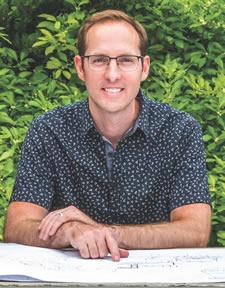 April 12, 2018 (Event Flyer) - Horticulture is awesome! An annual presentation sponsored by the SFA Horticulture Club to engage, inspire, and educate students and our community about the power of plants is set for April 14, 2018 at 2pm in the Pineywoods Native Plant Center.
April 12, 2018 (Event Flyer) - Horticulture is awesome! An annual presentation sponsored by the SFA Horticulture Club to engage, inspire, and educate students and our community about the power of plants is set for April 14, 2018 at 2pm in the Pineywoods Native Plant Center.
Presenting this year is Thomas Rainer, principal at Phyto Studio and author of 'Planting in a Post-Wild World.'
Thomas Rainer is a landscape architect, teacher, and author. He has designed landscapes for the U.S. Capital grounds, the Martin Luther King Jr. Memorial, and the New York Botanical Garden, as well as more than 100 gardens from Maine to Florida. He is now a celebrated public speaker who has garnered acclaim for his passionate presentations to audiences across the U.S. and in Europe. Mr. Rainer serves as a principal for the landscape architectural and consulting firm Phyto Studio in Washington, D.C. He has a broad range of expansive estates, rooftop gardens, botanical gardens, large-scale green infrastructure design and implementation, and national memorials. His work has been featured in numerous publications, including The New York Times, Landscape Architecture Magazine, The Washington Post, The Chicago Tribune, and Architectural Digest.
Students enter free with student ID! The cost for the public is $20 at the door. The Pineywoods Native Plant Center is located at 2900 Raguet Street, Nacogdoches, Texas 75964. Parking is available at the Pineywoods Native Plant Center and the nearby Raguet Elementary School located at 2428 Raguet Street, Nacogdoches, Texas 75964. Questions? Contact barnesj@sfasu.edu.
Visit www.Horticultureisawesome.com to reserve your seat today!









